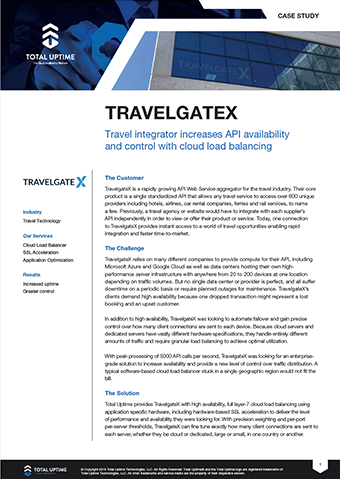Case Study: Load Balancing, SSL Acceleration, Application Optimization
Travel integrator increases availability and control with Global Server Load Balancing
Travelgate X is a rapidly growing API Web Service aggregator for the travel industry. Their core product is a single standardized API that allows any travel service to access over 600 unique providers including hotels, airlines, car rental companies, ferries and rail services, to name a few. Previously, a travel agency or website would have to integrate with each supplier’s API independently in order to view or offer their product or service. Today, one connection to Travelgate X provides instant access to a world of travel opportunities enabling rapid integration and faster time-to-market.
The Challenge
Travelgate X relies on many different companies to provide compute for their API, including Microsoft Azure and Google Cloud as well as data centers hosting their own high-performance server infrastructure with anywhere from 20 to 200 devices at one location depending on traffic volumes. But no single data center or provider is perfect, and all suffer downtime on a periodic basis or require planned outages for maintenance. Travelgate X’s clients demand high availability because one dropped transaction might represent a lost booking and an upset customer.
Travelgate X’s clients demand high availability because one dropped transaction might represent a lost booking and an upset customer.
In addition to high availability, Travelgate X was looking to automate failover and gain precise control over how many client connections are sent to each device. Because cloud servers and dedicated servers have vastly different hardware specifications, they handle entirely different amounts of traffic and require granular load balancing to achieve optimal utilization.
With peak processing of 5000 API calls per second, Travelgate X was looking for an enterprise-grade solution to increase availability and provide a new level of control over traffic distribution. A typical software-based cloud load balancer stuck in a single geographic region would not fit the bill.
The Solution
Total Uptime provides Travelgate X with high availability, full layer-7 cloud load balancing using application specific hardware, including hardware-based SSL acceleration to deliver the level of performance and availability they were looking for. With precision weighting and per-port per-server thresholds, Travelgate X can fine tune exactly how many client connections are sent to each server, whether they be cloud or dedicated, large or small, in one country or another.
Using Total Uptime’s fully customizable monitoring, servers can be removed from active load balancing automatically and within seconds if traffic volumes exceed pre-configured server capacity. And if a server goes completely down, or requires scheduled maintenance, it can be automatically or manually removed with the click of a button while sending overflow traffic to all remaining servers.
Total Uptime’s anycast-based cloud Virtual IP addresses allow control over API endpoints separately and ensure that requests are routed to the nearest POP achieving the lowest possible latency between end-users and API endpoints. The end result for Travelgate X is previously unattainable control over routing traffic to different providers for the same application, which ultimately has increased availability.
